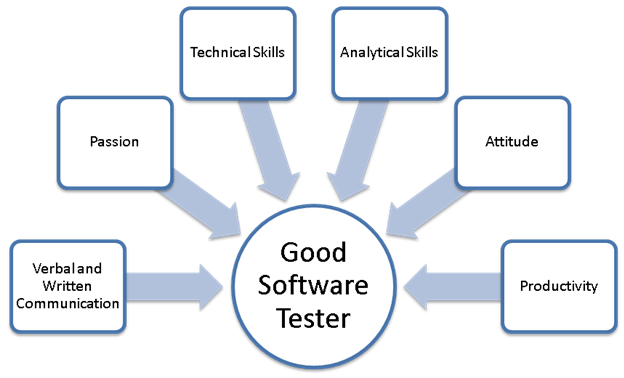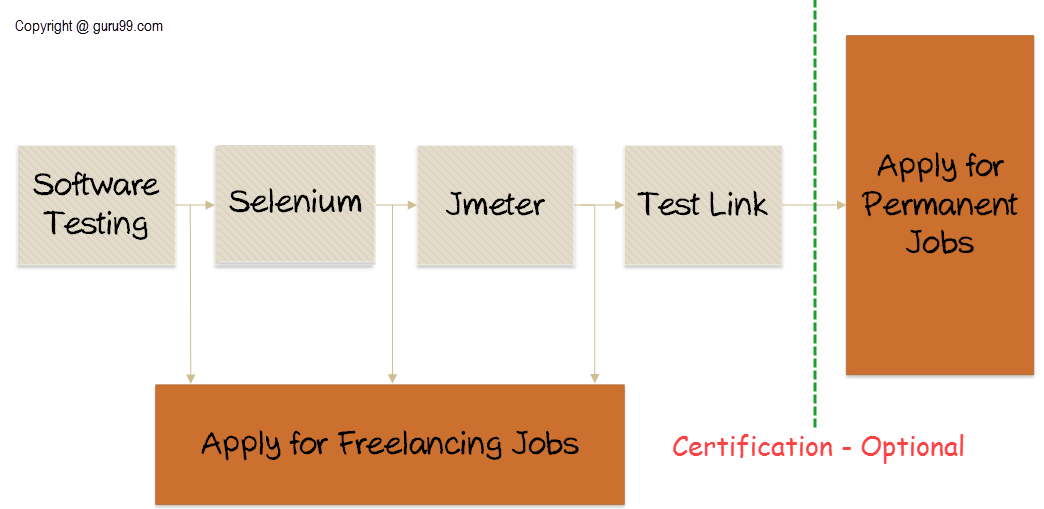Loadrunner
Download and Install HP LoadRunner: FREE Community Edition
Following is the step by step process to install LoadRunner Community Edition(Free version). Vugen comes...
This guide will take you through the In's and outs of software testing. If you plan to make a career in software testing, this is a MUST READ!
Software Testing is a process of verifying a computer system/program to decide whether it meets the specified requirements and produces the desired results. As a result, you identify bugs in software product/project.
Software Testing is indispensable to provide a quality product without any bug or issue.
In this tutorial, you will learn-
We will discuss the Technical and Non-Technical required to become a Software Tester
Following skills are essential to become a good Software quality tester. Compare your skill set against the following checklist to determine whether Software Testing is a reality for you-

Non-Technical skills of a Software Tester
This list is long, so please bear with us
For example - A tool like Testlink can be used for tracking all the test cases written by your team.
There are other tools available that can be utilized for Test Management. So, it is important to have knowledge and working experience of such tools because they are used in most of the companies.
Note - Only knowledge of any Automation tool is not sufficient to crack the interview, you must have good hands-on experience, so practice the tool of your choice to achieve mastery. Knowledge of any scripting language like VBScript, JavaScript, C# is always helpful as a tester if you are looking for a job into automation. Few companies also use Shell/Perl scripting, and there is a lot of demand for testers having knowledge of the same. Again, it will depend on the company and which tools are used by that company.
There is also a lot of scope for performance testing tools because applications need to be tested for their performance which is a part of non-functional testing.
That's it to technical knowledge. Please note you do not need ALL the technical skills listed above. The technical skill sets required vary with the Job Role and company processes.
Academic background of a software tester should be in Computer Science.
A BTech/ B.E., MCA, BCA, BSc- Computers, will land you a job quickly.
If you do not hold any of these degrees, then you must complete a software testing certification like ISTQB and CSTE which help you learn Software Development/ Test Life Cycle and other testing methodologies.
Compensation of a software tester varies from company to company. Average salary range of a software tester in the US is $45,993 - $74,935. Average Software testing career package in India is Rs 247,315 - Rs 449,111.
Also, a software tester is also given health insurance, bonuses, gratuity and other perks.
On any typical work day, you will be busy understanding requirement documents, creating test cases, executing test cases, reporting and re-testing bugs, attending review meetings and other team building activities.
Your Software Testing career growth as a software tester (QA Analyst) in typical CMMI level 5 company will look like following but will vary from company to company
Once you have got your hand dirty in manual testing, you can pursue following specializations
Software Testing as a Career pays Less Developers are more respected as compared to Testers
Contrary to popular belief, Software Testers (better known as QA professionals) are paid and treated at par with Software Developers in all "aspiring" companies. A career in Software Testing should never be considered as "second rated."
Software Testing is Boring
Software Testing could actually "test" your nerves since you need to make sense of Business Requirements and draft test cases based on your understanding. Software testing is not boring. What is boring is doing the same set of tasks repeatedly. The key is to try new things. For that matter, have you ever spoken to a software developer with more than 3 years' experience? He will tell you how boring his job has become off-lately.
For a complete newbie, here is our suggested approach to learning Software Testing

Process to become a Software Tester
You start with learning Basic principles of Software Testing. Once done you apply for freelancing jobs. This will help you gain practical knowledge and will fortify the testing concepts you have learned.
Next, you proceed to Selenium - Automation tool, then JMeter - Performance Testing tool and finally TestLink - Test Management Tool. All the while you are learning, we suggest you apply for freelancing jobs (apart from other benefits you will make some moolah too!).
Once you are through with all the tools, you may consider taking a certification. We recommend ISTQB. However, this is optional.
ISTQB Foundation level is the basic certification in Testing field.
It is not mandatory, but it will help increase your chances of getting the job. Most of the companies have this criterion.
A software tester with ISTQB cleared will be given more priority as compared to others.
After this, when you apply for permanent jobs in big corporations you will have many Software tester skills to offer as well some practical freelancing experience which may be of value and will increase your chances of being selected.
You can also pursue certification in a Testing tool of your choice.
Learning Guides: -
Hope to see you at a QA conference some Day! :-)
Here is a tool to help you make a career choice
Following is the step by step process to install LoadRunner Community Edition(Free version). Vugen comes...
{loadposition top-ads-automation-testing-tools} A bug tracking tool can help record, report,...
Agile Automation Testing Agile Automation Testing in software development is an approach of using...
What is POS Testing? POS Testing is defined as Testing of a Point of Sale Application. A POS or...
What is Waterfall methodology? Waterfall Model methodology which is also known as Liner Sequential Life...
In this tutorial, you will learn What are Embedded systems? What is Embedded Testing? Embedded...